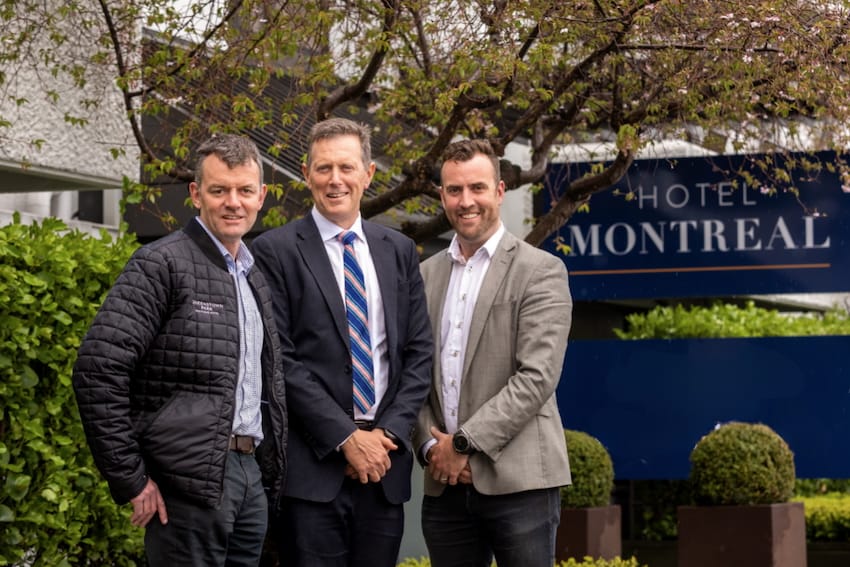For the Patterson family, buying their first five-star hotel in Queenstown was more than just a business move; it was a strategic model for success: being able to refer from their core 4-star operation, The Commodore Hotel. Now, with three high-end properties across Queenstown and Christchurch, this multi-generational hospitality family has carved out a niche in New Zealand’s luxury accommodation market. Their insights are invaluable for anyone considering entering the top end of the hotel game.
Find properties with room to add value
When the Pattersons assess a hotel for purchase, they’re not just looking at existing revenue or reputation. They’re looking at potential. “The ability to add value, primarily in space to expand, is key,” says Thomas Patterson, Director of the Patterson Group.That's been a constant across all their properties. At Queenstown Park Boutique Hotel, there was potential to add new suites on top of the existing structure. Hotel Montreal, located in Christchurch’s central city, offered something many city-centre hotels didn’t; off-street paringking and space to create a more expansive guest experience. “We saw unrealised potential,” says Thomas. “There was good infrastructure and a chance to really elevate the offering.”
Understand the market fit
While some questioned their decision to buy another hotel in the same city as their original operation (The Commodore Christchurch Airport Hotel), the Pattersons saw opportunity, not overlap. “The Commodore didn’t suit every type of stay,” explains Thomas. “We’d see guests park their cars at competitor hotels in the CBD. That told us there was demand for a luxury city-centre experience, and by offering both, it also gave us a chance to upgrade guests the event of sudden demand from flight disruptions.”Take a strategic, hands-on approach
Buying a 5-star hotel is financially complex and operationally demanding. The Pattersons recommend taking a measured approach: conduct thorough due diligence, spend time in the hotel before purchase, and understand the levers that influence performance.“We set a five-year performance target when we bought Hotel Montreal,” says Thomas. “The first two years were slower than we hoped - 20% below target. But we believed in the asset. Four years later, we’ve exceeded expectations.”
Their hands-on ownership style plays a big part. Whether it’s shadowing staff, improving service standards, or identifying operational gaps, the family believes success starts with being present. “Even well-run hotels have blind spots,” Thomas says. “Fixing those early on can deliver real gains.”
Reinvestment drives reputation
Maintaining luxury standards takes ongoing investment. The Pattersons estimate they reinvest $300,000 to $400,000 annually for smaller properties. For Hotel Montreal, early improvements included a gym, enhanced outdoor areas, upgraded TVs, and new artwork to create a more cohesive aesthetic.Guests notice. “People comment on the outdoor vibe; it’s stylish but relaxed,” Thomas says. “That atmosphere drives bookings, attracts functions, and improves reviews.”
They’ve also focused heavily on encouraging online reviews. “We saw another new 5-star hotel in Christchurch rocket up the rankings just by actively collecting guest feedback. That was a wake-up call. Proactive review collection works.”
Why ownership matters
A strong theme in the Patterson philosophy is long-term thinking, and that means owning the land. “One of Dad’s strongest business principles was to own the land you operate on,” Thomas says. “It gives you resilience when the market turns.”Brother Michael Patterson agrees. “Leased hotels can scale quickly, but they’re more vulnerable. For smaller-scale properties, ownership is essential. It’s hard to maintain control or plan long-term without it.”
That mindset is paying off. Recent zoning changes near Hotel Montreal now allow for taller development, opening future possibilities. The family has already added The Tack Rooms, two standalone architecturally-designed suites adjacent to the hotel which give them flexibility for special events or high-profile guests like All Black Campbell Johnstone, who used The Tack Rooms for his wedding preparation.
Growth doesn’t have to be big to be smart
“Growth doesn’t have to be dramatic,” says Ken Patterson, who manages the Queenstown Park Boutique Hotel. “You can improve in steps, as long as each step adds value.”That philosophy helped them navigate setbacks too. When they expanded the Queenstown hotel, delays meant reopening later than expected. “It was painful to close through winter, but the upgrade was worth it long-term.”
Advice for first-time luxury hotel buyers
For those entering the market, the Pattersons offer a few guiding principles:- Have a clear business plan that includes operational targets, not just acquisition.
- Understand your break-even point and aim for at least 80% average occupancy as soon as possible.
- Don’t underestimate the importance of guest experience; luxury travellers expect more than just nice rooms.
- Surround yourself with experts: legal, financial, and operational.
- Be present. The best culture and performance comes from owners who stay close to the business.
“There are still smart buys out there,” says Thomas. “Queenstown and Christchurch made sense for us; Queenstown for international tourism, Christchurch as a hub for South Island travel. But today, we’re seeing real opportunity in the regions too.”
Final thoughts
Owning a five-star hotel isn’t for the faint-hearted. But for those with vision, patience, and the right team, it can be one of the most resilient and rewarding assets in a portfolio.It's about the long view,” Thomas says. “Buy well, invest consistently, and always focus on the guest experience. If you do that, the returns will follow.”
Looking for a hotel to buy? then visit:
Share this article:

